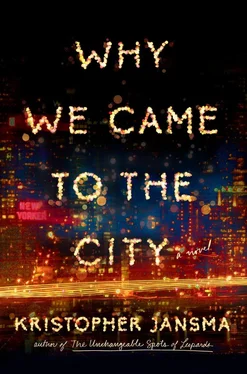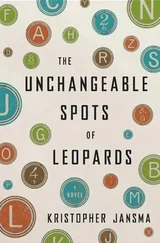What did you want to be when you were a child?
It was the day he knew he could never become this thing.
The two ladies began to count out their bills and fish through their change purses for the exact right amounts. Jacob’s father had done the same after every meal, as if a penny wasted here or there might be the difference between starvation and survival. Never tipping — not even when they’d gone to the Gramercy Tavern and Jacob had dipped his jacket sleeve in mustard, and the waiter had scrubbed it out with club soda for them — even then his father had left the exact bill, down to the rotten penny, and left without a word. Sometimes Jacob’s mother would still pretend to forget an umbrella or pen, then rush back to find it and slip a few dollars onto the table — a few dollars of the pitiful allowance that Jacob’s father gave her each week to cover the costs of groceries and housekeeping… not because he couldn’t afford more — a lot more — but because he didn’t trust her with it.
“Get you anything else?” Flo was asking.
“Just the check,” Jacob said. He didn’t feel drunk at all, but it seemed like George had had enough. He looked over and saw that William and his date had left. The bill came, and he almost sent it back. How could there be only three drinks on it? From George’s slump and dreamy eyes, Jacob would have sworn that he’d tossed back three on his own before he’d even arrived. When everything was settled, Jacob got up off the stool and went back to the men’s room to see what had become of his fine feathered friend. The little door marked Hommes was locked, however, from the inside.
“You fall in?” Jacob called.
“No, no,” George called back. “Sorry. Just a minute. Texting Sara something.”
Jacob thought he sounded drunker than when he’d left.
“That’s disgusting, George. That’s how people get parasites.”
He could hear George shuffling around clumsily. Jacob sighed. “We’re all settled up. I’m going outside for some air.”
• • •
Jacob stepped out onto the sidewalk. It was a few moments before he realized that he had left Oliver’s umbrella inside, and so against all his principles, he texted George to please grab it out of the bin before he came out. Great winds rushed down the valley between the dark buildings. It was surprisingly quiet, there on the cross street. In fact, Jacob couldn’t see another person all the way down the block in either direction. How often did that happen in Manhattan, he wondered, even at this hour?
Both lanes of Fiftieth Street were being ripped up, so traffic was being diverted around the block. No construction crews were working so late, but the lanes were still closed off by fat barrels, striped in orange and reflective white. Somewhere several young women were screeching about something or another, but only an echo reached Jacob’s ears. The wind blew westerly, carrying empty soda bottles and discarded Subway sandwich wrappers. A chewed-up looking scarf. A mashed-down cardboard box. Swarms of cigarette butts. He watched them scatter over the broken blacktop, heading out toward the avenue. Far off, by the old Lehman Brothers building, he watched two tall men in dark coats with briefcases exit a gleaming white revolving door. Glass, of course. They were all glass these days, the doors, the buildings too. Transparent but tinted. Delicate but impenetrable. Lessons learned, after 1929, were limited to making sure the windows no longer opened. No one liked to see their stockbroker sailing down past their thirtieth-story window. Jacob remembered the time Irene had taught him to press his hand against the building glass. It vibrated, alive. They built them to be slightly flexible, she’d explained, so they could lean this way and that, in high winds.
Then, at his back, Jacob felt a rush of cool air. He turned, expecting to see George at last, but instead it was William Cho.
“Were you still in there?” Jacob asked.
William nodded cautiously. “Yeah. I bumped into George in the bathroom. Or I mean, he bumped into me. Then he locked himself in a stall.”
“He’s pissed,” Jacob said coolly. “You broke up with our friend when she was sick.”
He expected William to make some excuse, but the boy made no motion to deny anything.
“So she finally told you she’s sick?”
Jacob’s face twisted. He hated that he’d been the last to know, but especially that William had been the first.
“And I guess you hate me too now?” William asked.
Jacob coughed. “Well, that’s not really fair. I hated you before.”
William nervously kicked at the wall. “How is she doing?”
Jacob didn’t feel like telling him anything. “What happened to your date?”
“I put her in a cab,” he said, extending his thumb over toward the avenue.
“Seemed like she’d have been happy to go home with you.”
“She’s the daughter of a woman my mother knows through her church,” William explained. “I tell her I’m not interested, but they don’t care. ‘But Sung-Lee went to Harvard to study art history! And now she works for an important pharmaceutical company,’ and I say, ‘Good for her.’ She says, ‘But Sung-Lee’s father owns four spa complexes in Passaic County.’ Eventually it’s easier to go on the date than to explain to my mother that I’m in love with a white girl with no family who’s dying of cancer and won’t return my calls.”
Jacob didn’t want to laugh but couldn’t help himself. Then the door to Bistro 19 squeaked open again, and out spilled a very drunk George, his arms wrapped tightly around a dozen umbrellas. He looked up in surprise at William, then at Jacob, then back down at the umbrellas in his own arms. There were floral patterned ones and small beige ones and green ones, and there in the middle of them all was Oliver’s black one, from Harrods.
George didn’t quite seem to know how he’d come by them all. “Which was yours?” he asked.
Jacob broke down and laughed until he thought he’d cry. William, not sure what else to do, laughed too, and George laughed so hard, he dropped the umbrellas onto the sidewalk. The two boys hurried to help him pick them up, and then it seemed like they ought to book it before anyone realized what George had done. Suddenly the night seemed young, and before any of them quite knew it, they were in a cab, umbrellas stuffed in every pocket, the sounds of horns and motors bringing them down and east.
The driver let them out below Union Square, which was mobbed with the usual late-night crowds of skateboarders and spectators. Little brunette girls in wool caps emerged from Whole Foods, burdened down with reusable bags. Yuppie couples headed out of Craftbar and into karaoke bars. Kids trying to look dangerous while sipping Jamba Juice outside the Best Buy. An old man lingered by the windows of an antique emporium, looking at an $8,000 Louis XV armchair — if he was worth a million bucks or homeless, Jacob couldn’t tell.
“Here’s what I propose,” William said. “We’re going to get royally smashed. And I’m going to tell my bosses that you’re looking for legal advice about your investments. And they’ll pay for it. Tell me something, George. Are you looking for new ways to invest your money?”
“Am I ever!” he cheered. “You know, I’ve got this bottle-cap collection back home in Ohio, but I really hate having all my assets tied up in beverage futures.”
William grinned. “What if I told you I could turn those bottle caps into a triple-tax-free retirement account? Let’s discuss it further over drinks.”
“Let’s!” George shouted, as if Willy Wonka had just invited him into the chocolate factory.
Jacob raised his hands to the full moon. “You know, with this sort of responsible behavior, it’s hard to fathom how you all managed to destroy the American economy.”
Читать дальше












